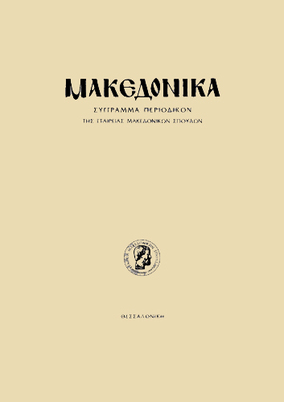Το Ελληνικό κράτος και ο σχολικός θεσμός στον υπόδουλο ελληνισμό : απόπειρα δημιουργίας νέου θεσμικού πλαισίου μέσα από τη νομιμοποίηση του θεσμού της σχολικής επιθεώρησης στη Μακεδονία το 1907
Part of : Μακεδονικά ; Vol.30, 1996, pages 291-312
Issue:
Pages:
291-312
Parallel Title:
The Greek State and the Schools of the Unredeemed Greeks : An Attempt to Create a New Institutional Framework through the Legitimisation of the School Inspectorate in Macedonia in 1907.
Section Title:
Articles
Abstract:
When the Greeks in Macedonia launched their cultural counter-attack against the Slavs’ claims by allowing the Greek school network to infiltrate the territory of the Ottoman Empire, the first systematic attempt was made to set up an organised inspectorate fot the Greek schools in order to co-ordinate the educational activities and to camouflage the action of the Greek consulates in the same sphere. However, obstacles to the legitimisation of the school inspectorate sprang up from many quarters. The first was connected with the patriarchal privileges and the institutional structure of Greek education as it had taken shape in the framework of the Ottoman reforms: the arbitrary appointment of a General Inspector of Greek Schools cut across the jurisdiction of the official Turkish syllabus inspector, who was responsible on behalf of the Porte for overseeing the schools of the subjugated communities. The second and more important obstacle to legitimising the new in stitution was presented by the refusal of the Patriarchate and the metro politans (who were responsible at a community level) to issue a patriarchal appointment for the Inspector General and the local inspectors, because in practice this would mean that «community education» would be abolished, the metropolitans and the school boards would be excluded from the decision making processes, and the education of the unredeemed Greeks would be controlled by the consulates according to the models followed in Greece. So the Inspectorate of Greek Schools did not become an organic part of the institutional framework of the education of the Greeks and was dependent on the good will of the metropolitans, who retained the right to allow or to forbid the local inspectors to carry out their task. Until these areas were liberated, the institution of the inspectorate co existed with the entrenched structures; and although it did not fulfil all the hopes that had been invested in it, it had a beneficial influence on the development of the unredeemed Greeks’ academic affairs.
Subject (LC):
Notes:
856:https://ejournals.epublishing.ekt.gr/index.php/makedonika/article/view/5809, DOI: https://doi.org/10.12681/makedonika.248
Electronic Resources:




